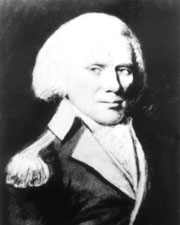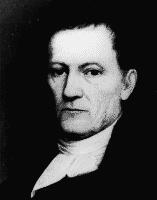

Left Photo: Courtesy of the Library of Congress
Right Photo: National Archives, Recs of Exposition, Anniv, and Memorial Commissions (148-CP-157)
William Few, Jr.
(1748-1828)
Georgia Delegate & Signer of
the US Constitution 1787


Left Photo: Courtesy of the Library of
Congress
Right Photo: National Archives, Recs of Exposition, Anniv, and
Memorial Commissions (148-CP-157)
The U.S. Constitution
(the full text)
The Grave of William Few Jr. at St. Paul's Episcopal Church, Augusta, GA.
| Years of Service:
1789-1793 Party: Anti-Administration FEW, William, a Delegate and a Senator from Georgia; born near Baltimore, Md., June 8, 1748; moved with his parents to Orange County, N.C., in 1758; completed preparatory studies; studied law; was admitted to the bar and commenced practice in Augusta, Ga., in 1776; member, State house of representatives 1777, 1779, 1783, 1793; member of the State executive council in 1777 and 1778; engaged in the expedition for the subjugation of east Florida in 1778; presiding judge of the Richmond County court and surveyor general in 1778; served as lieutenant colonel of the Richmond County Militia in 1779; Member of the Continental Congress 1780-1782 and 1786-1788; original trustee for establishing the University of Georgia in 1785; delegate to the convention which framed the Federal Constitution in 1787; delegate to the Georgia convention that ratified the Federal Constitution in 1788; elected to the United States Senate and served from March 4, 1789, to March 3, 1793; unsuccessful candidate for election to the United States Senate in 1795; judge of the circuit court of Georgia 1794-1797; moved to New York City in 1799; member, State assembly 1802-1805; State prison inspector 1802-1810; United States Commissioner of Loans in 1804; director of the Manhattan Bank 1804-1814, and president in 1814; served as alderman in 1813 and 1814; died in Fishkill, N.Y., July 16, 1828; interment in Reformed Dutch Church Cemetery, Beacon, Dutchess County, N.Y. Bibliography:Dictionary of American Biography; Few, William. “Autobiography of Colonel William Few of Georgia.” Magazine of American History 7 (November 1881): 343-58; “Senator Few on the First Session of the First Congress, 1790.” American Historical Review 16 (July 1911): 789-90. ================================================================= A United States statesman and banker. He was a signer of the U.S. Constitution for Georgia and a senator from Georgia, 1789-93, in the first U.S. Congress. Few was born near Baltimore, Maryland, and grew up in North Carolina. In 1776 he moved to Georgia. He was an officer in the militia and a delegate to the Continental Congress. Few moved to New York City in 1799 and later became involved in the banking business. ©1991 New Standard Encyclopedia – Standard Education Corporation – Chicago. ================================================================= "Without being a genius, he has more knowledge than his name and appearance would indicate. Although still young, he has been constantly employed during the war. His colleagues have a good opinion of him. He is very timid and awkward in society, unless one speaks to him about business." -- Character sketch from a report of the French Minister Otto to Foreign Minister Montmorin in Paris written in 1788. "Mr. Few possesses a strong natural Genius, and from application has acquired some knowledge of legal matters; -- he practices at the bar of Georgia, speaks tolerably well in the Legislature. He has been twice a Member of Congress, and served in that capacity with fidelity to his State, and honor to himself. Mr. Few is about 35 years of age." (Actually he was thirty-nine). -- Character sketch written by Major William Pierce, who also represented Georgia at the Constitutional Convention. ================================================================= Few was born in 1748. His father's family had emigrated from England to Pennsylvania in the 1680s, but the father had subsequently moved to Maryland, where he married and settled on a farm near Baltimore. William was born there. He encountered much hardship and received minimal schooling. When he was 10 years of age, his father, seeking better opportunity, moved his family to North Carolina. In 1771 Few, his father, and a brother associated themselves with the "Regulators," a group of frontiersmen who opposed the royal governor. As a result, the brother was hanged, the Few family farm was destroyed, and the father was forced to move once again, this time to Georgia. William remained behind, helping to settle his father's affairs, until 1776 when he joined his family near Wrightsboro, GA. About this time, he won admittance to the bar, based on earlier informal study, and set up practice in Augusta. When the War for Independence began, Few enthusiastically aligned himself with the Whig cause. Although largely self-educated, he soon proved his capacity for leadership and won a lieutenant-colonelcy in the dragoons. In addition, he entered politics. He was elected to the Georgia provincial congress of 1776 and during the war twice served in the assembly, in 1777 and 1779. During the same period, he also sat on the state executive council besides holding the positions of surveyor-general and Indian commissioner. He also served in the Continental Congress (1780-88), during which time he was reelected to the Georgia Assembly (1783). Four years later, Few was appointed as one of six state delegates to the Constitutional Convention, two of whom never attended and two others of whom did not stay for the duration. Few himself missed large segments of the proceedings, being absent during all of July and part of August because of congressional service, and never made a speech. Nonetheless, he contributed nationalist votes at critical times. Furthermore, as a delegate to the last sessions of the Continental Congress, he helped steer the Constitution past its first obstacle, approval by Congress. And he attended the state ratifying convention. Few became one of his state's first U.S. senators (1789-93). When his term ended, he headed back home and served again in the assembly. In 1796 he received an appointment as a federal judge for the Georgia circuit. For reasons unknown, he resigned his judgeship in 1799 at the age of 52 and moved to New York City. Few's career continued to blossom. He served 4 years in the legislature (1802-5) and then as inspector of prisons (1802-10), alderman (1813-14), and U.S. commissioner of loans (1804). From 1804 to 1814 he held a directorship at the Manhattan Bank and later the presidency of City Bank. A devout Methodist, he also donated generously to philanthropic causes. When Few died in 1828 at the age of 80 in Fishkill-on-the-Hudson (present Beacon), he was survived by his wife (born Catherine Nicholson) and three daughters. Originally buried in the yard of the local Reformed Dutch Church, his body was later reinterred at St. Paul's Church, Augusta, GA. Courtesy of: National Archives and Records Administration ================================================================= Of this patriotic individual, we only know that he was an active and prominent lawyer of Georgia, at the time of the call for thc convention to frame the constitution of the United States. He did not take an active part in the deliberations of that august body, but represented correctly the sentiments of the people of his native State. He retired from public life after the organization of the national government. He was one of those men, "few and far between," who effect more by solid weight of character than many can by eloquent speech or restless action. Source: Marshall, James V.. The United States Manual of Biography and History. Philadelphia: James B. Smith & Co., 1856. Page 188.================================================================= William Few, Jr. was my 1st cousin, seven times removed. His father, William Few, Sr. was son of Isaac Few and wife Hannah Stanford; my 7th great-grandparents. The Lineage: 8th. Richard Few (1625 England-1688) m. Jane Whitfield
(?-1674) ================================================================= |